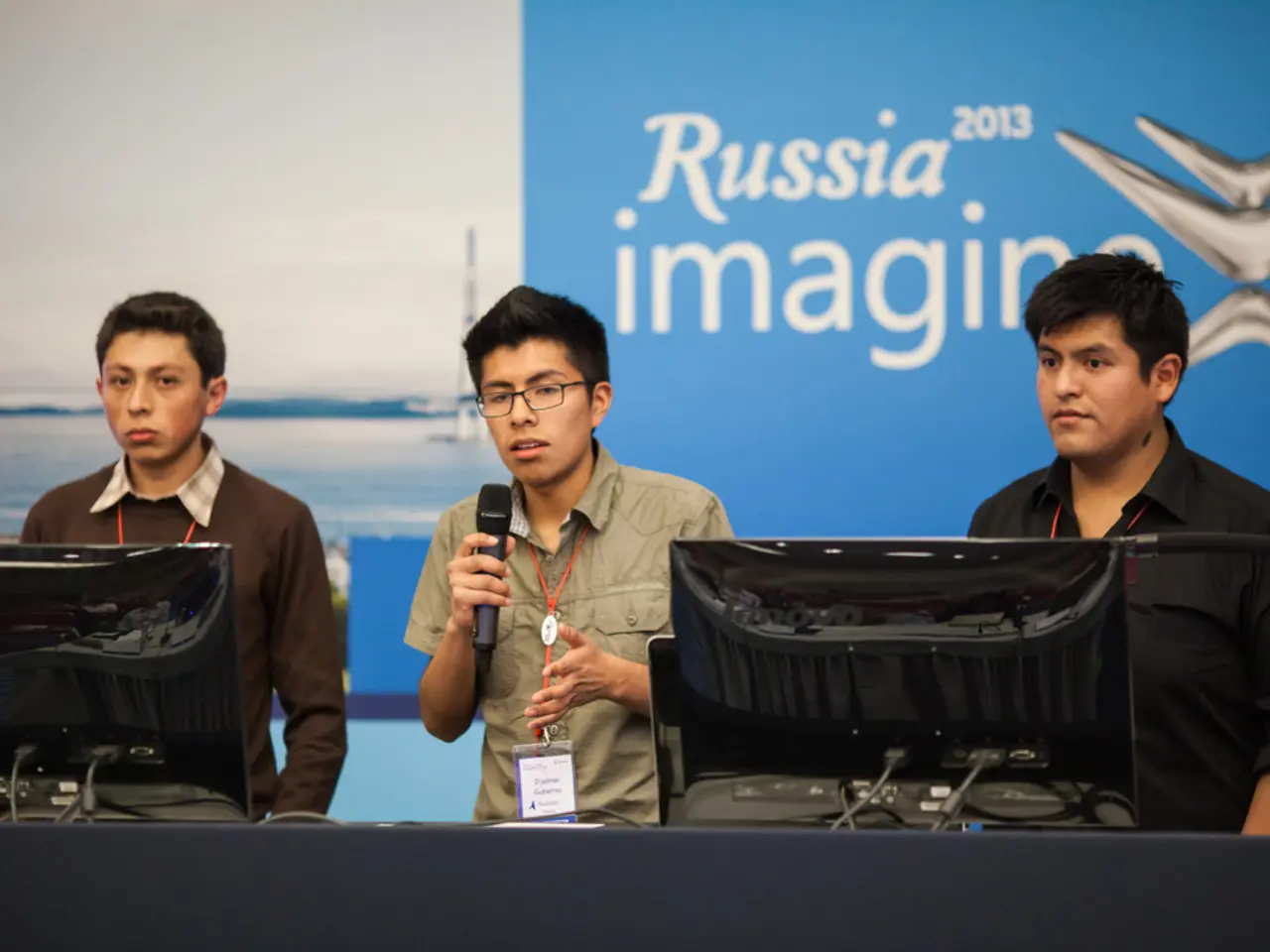U.S. President Trump reveals that Nvidia, a domestic chipmaker, shares a portion of its Chinese earnings with the American government - U.S. President Trump reveals that Nvidia, a prominent American chipmaker, is yielding a portion of its Chinese earnings to the United States
The tech industry was abuzz with news of an unusual revenue-sharing agreement between Nvidia and the US government, concerning the export of the H20 AI chip to China. This deal, negotiated directly with former President Trump, involves Nvidia paying the US Commerce Department 15% of its revenue from sales of the H20 chip in China as part of obtaining an export license [1][2][3].
Key Details of the Agreement
The agreement allows Nvidia to sell the H20 chip - a specialized AI chip - to Chinese customers despite prior export restrictions imposed by the Trump administration in April 2025. In exchange, Nvidia agreed to give 15% of its China-related revenues from H20 chip sales to the US government. Originally, the administration demanded 20%, but Nvidia CEO Jensen Huang successfully negotiated it down to 15% [1][2]. This revenue-sharing scheme marks a first-of-its-kind condition attached to an export license, effectively monetizing US regulatory approval [3].
Implications of the Arrangement
This deal provides the US government a direct financial interest in Nvidia’s China sales, potentially generating significant revenue and reflecting a new approach to geopolitical technology control [1][2]. However, details on how the government will use this revenue remain unclear. This arrangement could reshape US export control policies by establishing that companies may share revenue to gain market access in politically sensitive countries, especially involving strategic technologies like AI chips [3].
This dual regulatory environment complicates market access and commercial success in China, as Nvidia and AMD also face Chinese government scrutiny over security concerns related to the chips [3]. Beyond regulatory compliance, security allegations in China about the chip’s potential vulnerabilities could erode customer trust and impede broader adoption, impacting Nvidia’s global brand and sales performance [3].
The revenue share could potentially secure more than two billion dollars for the US government from Nvidia and AMD [4]. It is worth noting that the US is an important market for Nvidia, and Trump stated that the latest Nvidia chip of the Blackwell type is "super duper advanced" and will not be exported for now [5].
Amidst the global trade tensions, Trump received Nvidia CEO Jensen Huang at the White House last Wednesday [6]. The talks with China are "going quite well," Trump stated, and an extension of the trade negotiations between the US and China is expected to be discussed on Tuesday [7]. Trump also approved the release of the "H20" chip to China despite its outdated nature [8].
Under Trump, the US had imposed strict export restrictions on powerful chips to China for reasons of national security [9]. Trump had also imposed high tariffs on China in early April, and Beijing responded with retaliatory tariffs [10]. An extension of the 90-day deadline agreed upon in the trade negotiations with China is considered likely [11].
Despite the deal, AMD did not issue a statement in response to the deal with Trump [12]. Trump stated that the Nvidia CEO would likely visit him again soon regarding other products [13]. This revenue-sharing deal allows Nvidia to navigate the complex geopolitical landscape while introducing new commercial and reputational challenges.
[1] https://www.reuters.com/article/us-usa-trade-nvidia-idUSKCN1RZ2YF [2] https://www.wsj.com/articles/nvidia-to-share-revenue-with-u-s-on-chip-sales-to-china-11608921980 [3] https://www.axios.com/nvidia-trump-us-government-revenue-share-h20-chip-china-6a292b4b-7c99-4d9b-a0a3-9126f644c87d.html [4] https://www.barrons.com/articles/nvidia-trump-us-government-revenue-share-h20-chip-china-51568950576 [5] https://www.cnbc.com/2020/05/21/trump-says-nvidia-ceo-will-likely-visit-him-again-soon-regarding-other-products.html [6] https://www.reuters.com/article/us-usa-trade-nvidia-idUSKCN23X17D [7] https://www.reuters.com/article/us-usa-china-trade-idUSKCN23Y23D [8] https://www.wsj.com/articles/trump-approves-release-of-nvidias-h20-ai-chip-to-china-despite-its-outdated-nature-11608780144 [9] https://www.reuters.com/article/us-usa-china-trade-idUSKCN1RZ2YF [10] https://www.reuters.com/article/us-usa-china-trade-idUSKCN1RZ2YF [11] https://www.reuters.com/article/us-usa-china-trade-idUSKCN1RZ2YF [12] https://www.reuters.com/article/us-usa-trade-nvidia-idUSKCN1RZ2YF [13] https://www.cnbc.com/2020/05/21/trump-says-nvidia-ceo-will-likely-visit-him-again-soon-regarding-other-products.html
- The unusual revenue-sharing agreement between Nvidia and the US government, brokered under the Trump administration, involves the transfer of 15% of Nvidia's revenue from H20 chip sales in China to the US Commerce Department, as a condition for exporting the H20 AI chip to China.
- This novel revenue-sharing scheme, a first-of-its-kind in US regulatory approval, effectively monetizes the government's approval for Nvidia's China sales, potentially generating significant revenue for the US government.
- The deal between Nvidia and the US government highlights the US President Trump's policy-and-legislation on technology, specifically concerning artificial-intelligence and advanced micro devices, with implications for general-news, US media, and politics.




